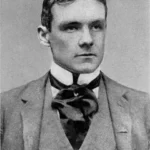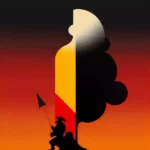 | |
Gallegher | |
| Author | Richard Harding Davis |
|---|---|
| Published |
1885
|
| Language | English |
| Nationality | American |
| Genre | Adventure, Mystery |
1885 Short Story
Gallegher
Gallegher is an English Adventure, Mystery short story by American writer Richard Harding Davis. It was first published in 1885.
Gallegher
by Richard Harding Davis
A Newspaper Story
We had had so many office-boys before Gallegher came among us that they had begun to lose the characteristics of individuals, and became merged in a composite photograph of small boys, to whom we applied the generic title of “Here, you”; or “You, boy.”
We had had sleepy boys, and lazy boys, and bright, “smart” boys, who became so familiar on so short an acquaintance that we were forced to part with them to save our own self-respect.
They generally graduated into district-messenger boys, and occasionally returned to us in blue coats with nickel-plated buttons, and patronized us.
But Gallegher was something different from anything we had experienced before. Gallegher was short and broad in build, with a solid, muscular broadness, and not a fat and dumpy shortness. He wore perpetually on his face a happy and knowing smile, as if you and the world in general were not impressing him as seriously as you thought you were, and his eyes, which were very black and very bright, snapped intelligently at you like those of a little black- and-tan terrier.
All Gallegher knew had been learnt on the streets; not a very good school in itself, but one that turns out very knowing scholars. And Gallagher had attended both morning and evening sessions. He could not tell you who the Pilgrim Fathers were, nor could he name the thirteen original States, but he knew all the officers of the twenty-second police district by name, and he could distinguish the clang of a fire-engine’s gong from that of a patrol-wagon or an ambulance fully two blocks distant. It was Gallegher who rang the alarm when the Woolwich Mills caught fire, while the officer on the beat was asleep, and it was Gallegher who led the “Black Diamonds” against the “Wharf Rats,” when they used to stone each other to their hearts’ content on the coal-wharves of Richmond.
I am afraid, now that I see these facts written down, that Gallegher was not a reputable character; but he was so very young and so very old for his years that we all liked him very much nevertheless. He lived in the extreme northern part of Philadelphia, where the cotton-and woollen-mills run down to the river, and how he ever got home after leaving the Press building at two in the morning, was one of the mysteries of the office. Sometimes he caught a night car, and sometimes he walked all the way, arriving at the little house, where his mother and himself lived alone, at four in the morning. Occasionally he was given a ride on an early milk-cart, or on one of the newspaper delivery wagons, with its high piles of papers still damp and sticky from the press. He knew several drivers of “night hawks”those cabs that prowl the streets at night looking for belated passengers and when it was a very cold morning he would not go home at all, but would crawl into one of these cabs and sleep, curled upon the cushions, until daylight.
Besides being quick and cheerful, Gallegher possessed a power of amusing the Press’s young men to a degree seldom attained by the ordinary mortal. His clog-dancing on the city editor’s desk, when that gentleman was upstairs fighting for two more columns of space, was always a source of innocent joy to us, and his imitations of the comedians of the variety halls delighted even the dramatic critic, from whom the comedians themselves failed to force a smile.
But Gallegher’s chief characteristic was his love for that element of news generically classed as “crime.”
Not that he ever did anything criminal himself. On the contrary, his was rather the work of the criminal specialist, and his morbid interest in the doings of all queer characters, his knowledge of their methods, their present whereabouts, and their past deeds of transgression often rendered him a valuable ally to our police reporter, whose daily feuilletons were the only portion of the paper Gallegher deigned to read.
In Gallegher the detective element was abnormally developed. He had shown this on several occasions, and to excellent purpose.
Once the paper had sent him into a Home for Destitute Orphans which was believed to be grievously mismanaged, and Gallegher, while playing the part of a destitute orphan, kept his eyes open to what was going on around him so faithfully that the story he told of the treatment meted out to the real orphans was sufficient to rescue the unhappy little wretches from the individual who had them in charge, and to have the individual himself sent to jail.
Gallegher’s knowledge of the aliases, terms of imprisonment, and various misdoings of the leading criminals in Philadelphia was almost as thorough as that of the chief of police himself, and he could tell to an hour when “Dutchy Mack” was to be let out of prison, and could identify at a glance “Dick Oxford, confidence man,” as “Gentleman Dan, petty thief.”
There were, at this time, only two pieces of news in any of the papers. The least important of the two was the big fight between the Champion of the United States and the Would-be Champion, arranged to take place near Philadelphia; the second was the Burrbank murder, which was filling space in newspapers all over the world, from New York to Bombay.
Richard F. Burrbank was one of the most prominent of New York’s railroad lawyers; he was also, as a matter of course, an owner of much railroad stock, and a very wealthy man. He had been spoken of as a political possibility for many high offices, and, as the counsel for a great railroad, was known even further than the great railroad itself had stretched its system.
At six o ‘clock one morning he was found by his butler lying at the foot of the hall stairs with two pistol wounds above his heart. He was quite dead. His safe, to which only he and his secretary had the keys, was found open, and $200,000 in bonds, stocks, and money, which had been placed there only the night before, was found missing. The secretary was missing also. His name was Stephen S. Hade, and his name and his description had been telegraphed and cabled to all parts of the world. There was enough circumstantial evidence to show, beyond any question or possibility of mistake, that he was the murderer.
It made an enormous amount of talk, and unhappy individuals were being arrested all over the country, and sent on to New York for identification. Three had been arrested at Liverpool, and one man just as he landed at Sydney, Australia. But so far the murderer had escaped.
We were all talking about it one night, as everybody else was all over the country, in the local room, and the city editor said it was worth a fortune to any one who chanced to run across Hade and succeeded in handing him over to the police. Some of us thought Hade had taken passage from some one of the smaller seaports, and others were of the opinion that he had buried himself in some cheap lodging-house in New York, or in one of the smaller towns in New Jersey.
“I shouldn’t be surprised to meet him out walking, right here in Philadelphia,” said one of the staff. “He’ll be disguised, of course, but you could always tell him by the absence of the trigger finger on his right hand. It’s missing, you know; shot off when he was a boy.”
“You want to look for a man dressed like a tough,” said the city editor; “for as this fellow is to all appearances a gentleman, he will try to look as little like a gentleman as possible.”
“No, he won’t,” said Gallegher, with that calm impertinence that made him dear to us. “He’ll dress just like a gentleman. Toughs don’t wear gloves, and you see he’s got to wear ’em. The first thing he thought of after doing for Burrbank was of that gone finger, and how he was to hide it. He stuffed the finger of that glove with cotton so’s to make it look like a whole finger, and the first time he takes off that glove they’ve got himsee, and he knows it. So what youse want to do is to look for a man with gloves on. I’ve been a-doing it for two weeks now, and I can tell you it’s hard work, for everybody wears gloves this kind of weather. But if you look long enough you’ll find him. And when you think it’s him, go up to him and hold out your hand in a friendly way, like a bunco-steerer, and shake his hand; and if you feel that his forefinger ain’t real flesh, but just wadded cotton, then grip to it with your right and grab his throat with your left, and holler for help.”
There was an appreciative pause.
“I see, gentlemen,” said the city editor, drily, “that Gallegher’s reasoning has impressed you; and I also see that before the week is out all of my young men will be under bonds for assaulting innocent pedestrians whose only offence is that they wear gloves in mid-winter.”
. . . . . . .
It was about a week after this that Detective Hefflefinger, of Inspector Byrnes’s staff, came over to Philadelphia after a burglar, of whose whereabouts he had been misinformed by telegraph. He brought the warrant, requisition, and other necessary papers with him, but the burglar had flown. One of our reporters had worked on a New York paper, and knew Hefflefinger, and the detective came to the office to see if he could help him in his so far unsuccessful search.
He gave Gallegher his card, and after Gallegher had read it, and had discovered who the visitor was, he became so demoralized that he was absolutely useless.
“One of Byrnes’s men” was a much more awe-inspiring individual to Gallegher than a member of the Cabinet. He accordingly seized his hat and overcoat, and leaving his duties to be looked after by others, hastened out after the object of his admiration, who found his suggestions and knowledge of the city so valuable, and his company so entertaining, that they became very intimate, and spent the rest of the day together.
In the meanwhile the managing editor had instructed his subordinates to inform Gallegher, when he condescended to return, that his services were no longer needed. Gallegher had played truant once too often. Unconscious of this, he remained with his new friend until late the same evening, and started the next afternoon toward the Press office.
As I have said, Gallegher lived in the most distant part of the city, not many minutes’ walk from the Kensington railroad station, where trains ran into the suburbs and on to New York.
It was in front of this station that a smoothly-shaven, well- dressed man brushed past Gallegher and hurried up the steps to the ticket office.
He held a walking-stick in his right hand, and Gallegher, who now patiently scrutinized the hands of every one who wore gloves, saw that while three fingers of the man’s hand were closed around the cane, the fourth stood out in almost a straight line with his palm.
Gallegher stopped with a gasp and with a trembling all over his little body, and his brain asked with a throb if it could be possible. But possibilities and probabilities were to be discovered later. Now was the time for action.
He was after the man in a moment, hanging at his heels and his eyes moist with excitement.
He heard the man ask for a ticket to Torresdale, a little station just outside of Philadelphia, and when he was out of hearing, but not out of sight, purchased one for the same place.
The stranger went into the smoking-car, and seated himself at one end toward the door. Gallegher took his place at the opposite end.
He was trembling all over, and suffered from a slight feeling of nausea. He guessed it came from fright, not of any bodily harm that might come to him, but at the probability of failure in his adventure and of its most momentous possibilities.
The stranger pulled his coat collar up around his ears, hiding the lower portion of his face, but not concealing the resemblance in his troubled eyes and close-shut lips to the likenesses of the murderer Hade.
They reached Torresdale in half an hour, and the stranger, alighting quickly, struck off at a rapid pace down the country road leading to the station.
Gallegher gave him a hundred yards’ start, and then followed slowly after. The road ran between fields and past a few frame- houses set far from the road in kitchen gardens.
Once or twice the man looked back over his shoulder, but he saw only a dreary length of road with a small boy splashing through the slush in the midst of it and stopping every now and again to throw snowballs at belated sparrows.
After a ten minutes’ walk the stranger turned into a side road which led to only one place, the Eagle Inn, an old roadside hostelry known now as the headquarters for pothunters from the Philadelphia game market and the battle-ground of many a cock- fight.
Gallegher knew the place well. He and his young companions had often stopped there when out chestnutting on holidays in the autumn.
The son of the man who kept it had often accompanied them on their excursions, and though the boys of the city streets considered him a dumb lout, they respected him somewhat owing to his inside knowledge of dog-and cock-fights.
The stranger entered the inn at a side door, and Gallegher, reaching it a few minutes later, let him go for the time being, and set about finding his occasional playmate, young Keppler.
Keppler’s offspring was found in the wood-shed.
“‘Tain’t hard to guess what brings you out here,” said the tavern- keeper’s son, with a grin; “it’s the fight.”
“What fight?” asked Gallegher, unguardedly.
“What fight? Why, THE fight,” returned his companion, with the slow contempt of superior knowledge. “It’s to come off here to- night. You knew that as well as me; anyway your sportin’ editor knows it. He got the tip last night, but that won’t help you any. You needn’t think there’s any chance of your getting a peep at it. Why, tickets is two hundred and fifty apiece!”
“Whew!” whistled Gallegher, “where’s it to be?”
“In the barn,” whispered Keppler. “I helped ’em fix the ropes this morning, I did.”
“Gosh, but you’re in luck,” exclaimed Gallegher, with flattering envy. “Couldn’t I jest get a peep at it?”
“Maybe,” said the gratified Keppler. “There’s a winder with a wooden shutter at the back of the barn. You can get in by it, if you have some one to boost you up to the sill.”
“Sa-a-y,” drawled Gallegher, as if something had but just that moment reminded him. “Who’s that gent who come down the road just a bit ahead of mehim with the cape-coat! Has he got anything to do with the fight?”
“Him?” repeated Keppler in tones of sincere disgust. “Nooh, he ain’t no sport. He’s queer, Dad thinks. He come here one day last week about ten in the morning, said his doctor told him to go out ‘en the country for his health. He’s stuck up and citified, and wears gloves, and takes his meals private in his room, and all that sort of truck. They was saying in the saloon last night that they thought he was hiding from something, and Dad, just to try him, asks him last night if he was coming to see the fight. He looked sort of scared, and said he didn’t want to see no fight. And then Dad says, ‘I guess you mean you don’t want no fighters to see you.’ Dad didn’t mean no harm by it, just passed it as a joke; but Mr. Carleton, as he calls himself, got white as a ghost an’ says, ‘I’ll go to the fight willing enough,’ and begins to laugh and joke. And this morning he went right into the bar-room, where all the sports were setting, and said he was going in to town to see some friends; and as he starts off he laughs an’ says, ‘This don’t look as if I was afraid of seeing people, does it?’ but Dad says it was just bluff that made him do it, and Dad thinks that if he hadn’t said what he did, this Mr. Carleton wouldn’t have left his room at all.”
Gallegher had got all he wanted, and much more than he had hoped forso much more that his walk back to the station was in the nature of a triumphal march.
He had twenty minutes to wait for the next train, and it seemed an hour. While waiting he sent a telegram to Hefflefinger at his hotel. It read: “Your man is near the Torresdale station, on Pennsylvania Railroad; take cab, and meet me at station. Wait until I come. GALLEGHER.”
With the exception of one at midnight, no other train stopped at Torresdale that evening, hence the direction to take a cab. The train to the city seemed to Gallegher to drag itself by inches. It stopped and backed at purposeless intervals, waited for an express to precede it, and dallied at stations, and when, at last, it reached the terminus, Gallegher was out before it had stopped and was in the cab and off on his way to the home of the sporting editor.
The sporting editor was at dinner and came out in the hall to see him, with his napkin in his hand. Gallegher explained breathlessly that he had located the murderer for whom the police of two continents were looking, and that he believed, in order to quiet the suspicions of the people with whom he was hiding, that he would be present at the fight that night.
The sporting editor led Gallegher into his library and shut the door. “Now,” he said, “go over all that again.”
Gallegher went over it again in detail, and added how he had sent for Hefflefinger to make the arrest in order that it might be kept from the knowledge of the local police and from the Philadelphia reporters.
“What I want Hefflefinger to do is to arrest Hade with the warrant he has for the burglar,” explained Gallegher; “and to take him on to New York on the owl train that passes Torresdale at one. It don’t get to Jersey City until four o’clock, one hour after the morning papers go to press. Of course, we must fix Hefflefinger so’s he’ll keep quiet and not tell who his prisoner really is.”
The sporting editor reached his hand out to pat Gallegher on the head, but changed his mind and shook hands with him instead.
“My boy,” he said, “you are an infant phenomenon. If I can pull the rest of this thing off to-night, it will mean the $5,000 reward and fame galore for you and the paper. Now, I’m going to write a note to the managing editor, and you can take it around to him and tell him what you’ve done and what I am going to do, and he’ll take you back on the paper and raise your salary. Perhaps you didn’t know you’ve been discharged?”
“Do you think you ain’t a-going to take me with you?” demanded Gallegher. “Why, certainly not. Why should I? It all lies with the detective and myself now. You’ve done your share, and done it well. If the man’s caught, the reward’s yours. But you’d only be in the way now. You’d better go to the office and make your peace with the chief.”
“If the paper can get along without me, I can get along without the old paper,” said Gallegher, hotly. “And if I ain’t a-going with you, you ain’t neither, for I know where Hefflefinger is to be, and you don’t, and I won’t tell you.”
“Oh, very well, very well,” replied the sporting editor, weakly capitulating. “I’ll send the note by a messenger; only mind, if you lose your place, don’t blame me.”
Gallegher wondered how this man could value a week’s salary against the excitement of seeing a noted criminal run down, and of getting the news to the paper, and to that one paper alone.
From that moment the sporting editor sank in Gallegher’s estimation.
Mr. Dwyer sat down at his desk and scribbled off the following note:
“I have received reliable information that Hade, the Burrbank murderer, will be present at the fight to-night. We have arranged it so that he will be arrested quietly and in such a manner that the fact may be kept from all other papers. I need not point out to you that this will be the most important piece of news in the country to-morrow.
“Yours, etc.,
“MICHAEL E. DWYER.”
The sporting editor stepped into the waiting cab, while Gallegher whispered the directions to the driver. He was told to go first to a district-messenger office, and from there up to the Ridge Avenue Road, out Broad Street, and on to the old Eagle Inn, near Torresdale.
It was a miserable night. The rain and snow were falling together, and freezing as they fell. The sporting editor got out to send his message to the Press office, and then lighting a cigar, and turning up the collar of his great-coat, curled up in the corner of the cab.
“Wake me when we get there, Gallegher,” he said. He knew he had a long ride, and much rapid work before him, and he was preparing for the strain.
To Gallegher the idea of going to sleep seemed almost criminal. From the dark corner of the cab his eyes shone with excitement, and with the awful joy of anticipation. He glanced every now and then to where the sporting editor’s cigar shone in the darkness, and watched it as it gradually burnt more dimly and went out. The lights in the shop windows threw a broad glare across the ice on the pavements, and the lights from the lamp-posts tossed the distorted shadow of the cab, and the horse, and the motionless driver, sometimes before and sometimes behind them.
After half an hour Gallegher slipped down to the bottom of the cab and dragged out a lap-robe, in which he wrapped himself. It was growing colder, and the damp, keen wind swept in through the cracks until the window-frames and woodwork were cold to the touch.
An hour passed, and the cab was still moving more slowly over the rough surface of partly paved streets, and by single rows of new houses standing at different angles to each other in fields covered with ash-heaps and brick-kilns. Here and there the gaudy lights of a drug-store, and the forerunner of suburban civilization, shone from the end of a new block of houses, and the rubber cape of an occasional policeman showed in the light of the lamp-post that he hugged for comfort.
Then even the houses disappeared, and the cab dragged its way between truck farms, with desolate-looking, glass-covered beds, and pools of water, half-caked with ice, and bare trees, and interminable fences.
Once or twice the cab stopped altogether, and Gallegher could hear the driver swearing to himself, or at the horse, or the roads. At last they drew up before the station at Torresdale. It was quite deserted, and only a single light cut a swath in the darkness and showed a portion of the platform, the ties, and the rails glistening in the rain. They walked twice past the light before a figure stepped out of the shadow and greeted them cautiously.
“I am Mr. Dwyer, of the Press,” said the sporting editor, briskly. “You’ve heard of me, perhaps. Well, there shouldn’t be any difficulty in our making a deal, should there? This boy here has found Hade, and we have reason to believe he will be among the spectators at the fight to-night. We want you to arrest him quietly, and as secretly as possible. You can do it with your papers and your badge easily enough. We want you to pretend that you believe he is this burglar you came over after. If you will do this, and take him away without any one so much as suspecting who he really is, and on the train that passes here at 1.20 for New York, we will give you $500 out of the $5,000 reward. If, however, one other paper, either in New York or Philadelphia, or anywhere else, knows of the arrest, you won’t get a cent. Now, what do you say?”
The detective had a great deal to say. He wasn’t at all sure the man Gallegher suspected was Hade; he feared he might get himself into trouble by making a false arrest, and if it should be the man, he was afraid the local police would interfere.
“We’ve no time to argue or debate this matter,” said Dwyer, warmly. “We agree to point Hade out to you in the crowd. After the fight is over you arrest him as we have directed, and you get the money and the credit of the arrest. If you don’t like this, I will arrest the man myself, and have him driven to town, with a pistol for a warrant.”
Hefflefinger considered in silence and then agreed unconditionally. “As you say, Mr. Dwyer,” he returned. “I’ve heard of you for a thoroughbred sport. I know you’ll do what you say you’ll do; and as for me I’ll do what you say and just as you say, and it’s a very pretty piece of work as it stands.”
They all stepped back into the cab, and then it was that they were met by a fresh difficulty, how to get the detective into the barn where the fight was to take place, for neither of the two men had $250 to pay for his admittance.
But this was overcome when Gallegher remembered the window of which young Keppler had told him.
In the event of Hade’s losing courage and not daring to show himself in the crowd around the ring, it was agreed that Dwyer should come to the barn and warn Hefflefinger; but if he should come, Dwyer was merely to keep near him and to signify by a prearranged gesture which one of the crowd he was.
They drew up before a great black shadow of a house, dark, forbidding, and apparently deserted. But at the sound of the wheels on the gravel the door opened, letting out a stream of warm, cheerful light, and a man’s voice said, “Put out those lights. Don’t youse know no better than that?” This was Keppler, and he welcomed Mr. Dwyer with effusive courtesy.
The two men showed in the stream of light, and the door closed on them, leaving the house as it was at first, black and silent, save for the dripping of the rain and snow from the eaves.
The detective and Gallegher put out the cab’s lamps and led the horse toward a long, low shed in the rear of the yard, which they now noticed was almost filled with teams of many different makes, from the Hobson’s choice of a livery stable to the brougham of the man about town.
“No,” said Gallegher, as the cabman stopped to hitch the horse beside the others, “we want it nearest that lower gate. When we newspaper men leave this place we’ll leave it in a hurry, and the man who is nearest town is likely to get there first. You won’t be a-following of no hearse when you make your return trip.”
Gallegher tied the horse to the very gate-post itself, leaving the gate open and allowing a clear road and a flying start for the prospective race to Newspaper Row.
The driver disappeared under the shelter of the porch, and Gallegher and the detective moved off cautiously to the rear of the barn. “This must be the window,” said Hefflefinger, pointing to a broad wooden shutter some feet from the ground.
“Just you give me a boost once, and I’ll get that open in a jiffy,” said Gallegher.
The detective placed his hands on his knees, and Gallegher stood upon his shoulders, and with the blade of his knife lifted the wooden button that fastened the window on the inside, and pulled the shutter open.
Then he put one leg inside over the sill, and leaning down helped to draw his fellow-conspirator up to a level with the window. “I feel just like I was burglarizing a house,” chuckled Gallegher, as he dropped noiselessly to the floor below and refastened the shutter. The barn was a large one, with a row of stalls on either side in which horses and cows were dozing. There was a haymow over each row of stalls, and at one end of the barn a number of fence- rails had been thrown across from one mow to the other. These rails were covered with hay.
In the middle of the floor was the ring. It was not really a ring, but a square, with wooden posts at its four corners through which ran a heavy rope. The space inclosed by the rope was covered with sawdust.
Gallegher could not resist stepping into the ring, and after stamping the sawdust once or twice, as if to assure himself that he was really there, began dancing around it, and indulging in such a remarkable series of fistic manoeuvres with an imaginary adversary that the unimaginative detective precipitately backed into a corner of the barn.
“Now, then,” said Gallegher, having apparently vanquished his foe, “you come with me.” His companion followed quickly as Gallegher climbed to one of the haymows, and crawling carefully out on the fence-rail, stretched himself at full length, face downward. In this position, by moving the straw a little, he could look down, without being himself seen, upon the heads of whomsoever stood below. “This is better’n a private box, ain’t it?” said Gallegher.
The boy from the newspaper office and the detective lay there in silence, biting at straws and tossing anxiously on their comfortable bed.
It seemed fully two hours before they came. Gallegher had listened without breathing, and with every muscle on a strain, at least a dozen times, when some movement in the yard had led him to believe that they were at the door.
And he had numerous doubts and fears. Sometimes it was that the police had learnt of the fight, and had raided Keppler’s in his absence, and again it was that the fight had been postponed, or, worst of all, that it would be put off until so late that Mr. Dwyer could not get back in time for the last edition of the paper. Their coming, when at last they came, was heralded by an advance-guard of two sporting men, who stationed themselves at either side of the big door.
“Hurry up, now, gents,” one of the men said with a shiver, “don’t keep this door open no longer’n is needful.”
It was not a very large crowd, but it was wonderfully well selected. It ran, in the majority of its component parts, to heavy white coats with pearl buttons. The white coats were shouldered by long blue coats with astrakhan fur trimmings, the wearers of which preserved a cliqueness not remarkable when one considers that they believed every one else present to be either a crook or a prize- fighter.
There were well-fed, well-groomed clubmen and brokers in the crowd, a politician or two, a popular comedian with his manager, amateur boxers from the athletic clubs, and quiet, close-mouthed sporting men from every city in the country. Their names if printed in the papers would have been as familiar as the types of the papers themselves.
And among these men, whose only thought was of the brutal sport to come, was Hade, with Dwyer standing at ease at his shoulder, Hade, white, and visibly in deep anxiety, hiding his pale face beneath a cloth travelling-cap, and with his chin muffled in a woollen scarf. He had dared to come because he feared his danger from the already suspicious Keppler was less than if he stayed away. And so he was there, hovering restlessly on the border of the crowd, feeling his danger and sick with fear.
When Hefflefinger first saw him he started up on his hands and elbows and made a movement forward as if he would leap down then and there and carry off his prisoner single-handed.
“Lie down,” growled Gallegher; “an officer of any sort wouldn’t live three minutes in that crowd.”
The detective drew back slowly and buried himself again in the straw, but never once through the long fight which followed did his eyes leave the person of the murderer. The newspaper men took their places in the foremost row close around the ring, and kept looking at their watches and begging the master of ceremonies to “shake it up, do.”
There was a great deal of betting, and all of the men handled the great roll of bills they wagered with a flippant recklessness which could only be accounted for in Gallegher’s mind by temporary mental derangement. Some one pulled a box out into the ring and the master of ceremonies mounted it, and pointed out in forcible language that as they were almost all already under bonds to keep the peace, it behooved all to curb their excitement and to maintain a severe silence, unless they wanted to bring the police upon them and have themselves “sent down” for a year or two.
Then two very disreputable-looking persons tossed their respective principals’ high hats into the ring, and the crowd, recognizing in this relic of the days when brave knights threw down their gauntlets in the lists as only a sign that the fight was about to begin, cheered tumultuously.
This was followed by a sudden surging forward, and a mutter of admiration much more flattering than the cheers had been, when the principals followed their hats, and slipping out of their great- coats, stood forth in all the physical beauty of the perfect brute.
Their pink skin was as soft and healthy-looking as a baby’s, and glowed in the lights of the lanterns lik







